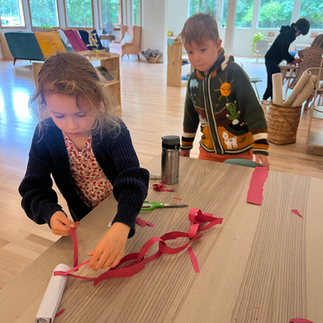Week 5: Choice Words - Learner vs Student
- Sheryl - Lead Guide
- Oct 5, 2025
- 2 min read
If I had to guess, I would bet that for most of you, one of the first things you noticed about Acton’s learning design was that the language we use is quite different from what you’ve seen elsewhere.
Learner vs. student
Studio vs. classroom
Guide vs. teacher
Badge vs. grade
Exhibition vs. test
I know…it takes some getting used to. But is this just a matter of semantics or is there something deeper going on here?
It turns out that words matter. The thing we call something shapes our expectations for it, and our expectations for it shape our experience with it.
So to help you understand why we’ve adopted this nomenclature, we’ll be rolling out a series of posts over the next few weeks called Choice Words, where we’ll tackle these terms one by one. My hope is that along the way you’ll discover that these words aren’t just an exercise in semantics, but are instead an important reflection of the realities of life in an Acton studio.
Let’s dive in with learner.
Why do we call the children learners, rather than students?
To get at the heart of this, let’s first consider what a student is. A student is someone who receives an education, and their role is typically passive. The student’s job is to absorb the content provided and then reproduce it in whatever format is required by the instructor – tests, quizzes, essays, and of course the iconic standardized test, the ultimate measure of a student’s capacities, tidily quantifying the learning into a single score that can be conveniently tucked into a spreadsheet.
Let’s now contrast that with a learner.
A learner is an active participant and co-creator whose role is to actively pursue growth.
A learner is not dependent upon an expert to disseminate information, but has agency to make decisions, solve problems, and take risks as she builds understanding and uncovers new and creative solutions.
A learner does not passively absorb but instead takes on challenges, discovers, fails, tries again, and along the way, grows.
A learner resists the idea of simply fulfilling mandated requirements of a curriculum but instead connects each learning experience to the person he is becoming and his important calling in the world.
And because of this, a learner seeks to learn regardless of whether he is in a formal educational setting, recognizing that often the most meaningful growth happens outside the structure of a traditional academic curriculum.
We can’t settle for calling these young people students. It’s not that we’re trying to play word games or be different simply for the sake of being different; it’s simply that traditional terms don’t fit. And so we must develop a new vocabulary to match the reality of what is happening in the studios each and every day.
“Develop a passion for learning. If you do, you will never cease to grow.”
Anthony J. D’Angelo







































Comments